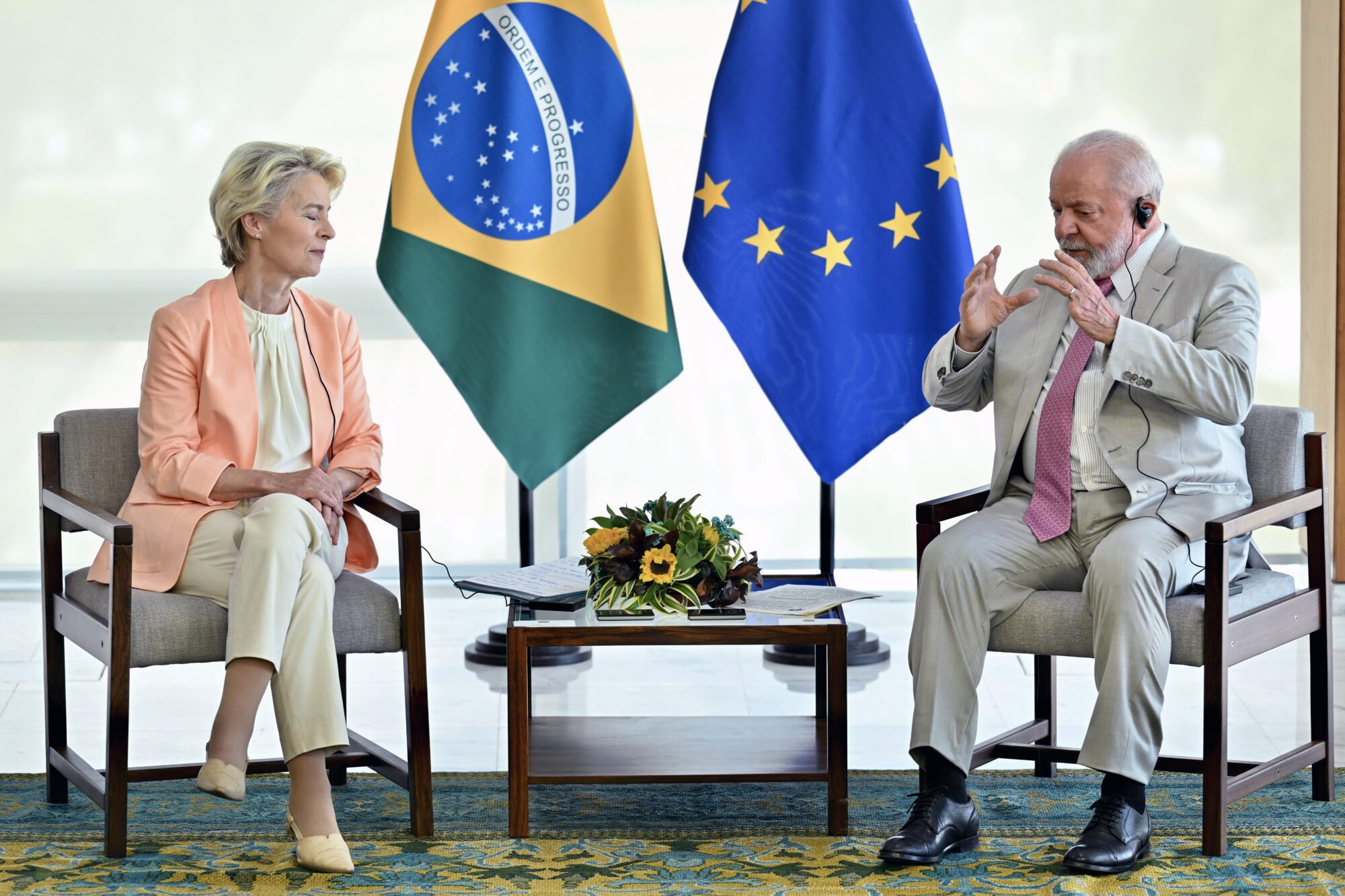
European Commission President Ursula von der Leyen (left) and Brazilian President Luiz Inácio Lula da Silva (right), Brasilia, June 12th.
Brazilian President Luiz Inácio Lula da Silva signaled readiness to finally conclude the much-anticipated EU-Mercosur trade deal during the first day of EU Commission President Ursula von der Leyen’s weeklong trip to Latin America on Monday, June 12th, but also voiced concerns over certain environmental obligations Brussels would like to include in the pact.
During Monday’s joint press conference of the two presidents in Brasilia, Lula reminded the Commission chief that Brussels’ usual strong-arming does not necessarily work outside of Europe:
I told President von der Leyen about the concerns we have about the additional instrument that enhances Brazil’s obligations and makes Brazil the object of sanctions in case of breach of the agreement.
The premise that should exist between strategic partners should be mutual confidence and not mistrust or sanctions.
The “additional instrument” Lula referred to is an extra sustainability and environmental protection document—mainly to stop the deforestation in the Amazon—presented by the EU trade negotiators in recent months after a few EU countries (notably France and Austria) began threatening the deal if their climate and agricultural concerns were not included.
So far, the Mercosur bloc—a Spanish abbreviation for Southern Common Market, consisting of Argentina, Brazil, Paraguay, and Uruguay as full members—did not officially reply to the addendum, but EU officials expect to receive it by the end of the month. However, judged by Lula’s recent comment, South America might not be happy to let the EU tell them what to do with their forests.
Nonetheless, von der Leyen was optimistic that the deal is now in the final stage. “We both believe it is now the time to conclude the EU-Mercosul agreement,” the Commission chief said at the press conference. “We have the ambition, the two of us, to get it done as soon as possible, the latest by the end of the year.”
The historic trade and cooperation deal with the members of Mercosur—which would allow South American agricultural products much better access to Europe, while granting the same export advantages to EU industrial manufacturers—has been in the works for over two decades with numerous issues slowing the process.
In early 2023, however, the stars finally appeared to align, as EU lawmakers declared that a rare “window of opportunity” had opened—in no small part due to Lula’s 2022 election victory over Brazil’s famously protectionist “Tropical Trump,” ex-president, Jair Bolsonaro.
However, the socialist veteran politician did not turn out to be the ideal partner some EU countries were hoping for. Earlier this year, the negotiations were almost derailed after Lula prompted widespread outrage in Brussels by suggesting that NATO weapons shipments to Ukraine are the primary obstacles to peace negotiations and urging the West to cease all military aid.
At last, cooler heads prevailed and EU members were able to move past the scandalous comments, but mainly because of the uncomfortable realization that Brussels needs the deal more than South America does. Apart from the economic angle, the Mercosur trade deal’s strategic significance is also clear, since if the EU fails to offer an attractive compromise soon, Beijing will be quick to fill in any gap, increasing Chinese economic and political influence globally.
The geopolitical vector was made obvious by the leaked EU Council strategy to win back “key global partners” from China’s growing sphere of influence in April, primarily by outbidding Beijing in trade deal offers. Brazil is especially important, whose President Lula—being among the original founders of the BRICS group—naturally gravitates toward stronger ties with China.
During this week, von der Leyen will also visit Argentina, Chile, and Mexico, all of whom are considered important assets in the growing geopolitical rivalry between Brussels and Beijing.
